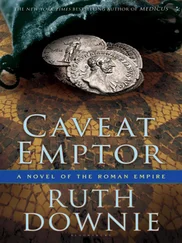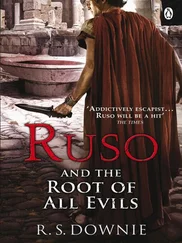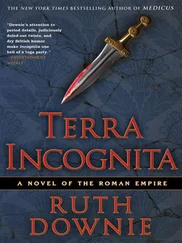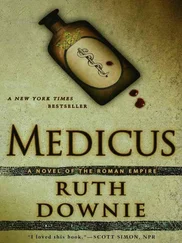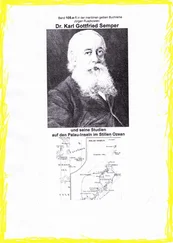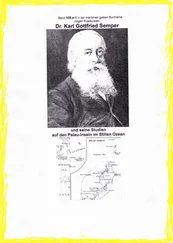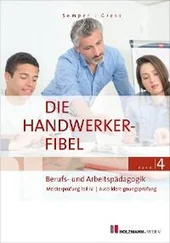Ruth Downie - Semper Fidelis
Здесь есть возможность читать онлайн «Ruth Downie - Semper Fidelis» весь текст электронной книги совершенно бесплатно (целиком полную версию без сокращений). В некоторых случаях можно слушать аудио, скачать через торрент в формате fb2 и присутствует краткое содержание. Жанр: Исторический детектив, на английском языке. Описание произведения, (предисловие) а так же отзывы посетителей доступны на портале библиотеки ЛибКат.
- Название:Semper Fidelis
- Автор:
- Жанр:
- Год:неизвестен
- ISBN:нет данных
- Рейтинг книги:5 / 5. Голосов: 1
-
Избранное:Добавить в избранное
- Отзывы:
-
Ваша оценка:
- 100
- 1
- 2
- 3
- 4
- 5
Semper Fidelis: краткое содержание, описание и аннотация
Предлагаем к чтению аннотацию, описание, краткое содержание или предисловие (зависит от того, что написал сам автор книги «Semper Fidelis»). Если вы не нашли необходимую информацию о книге — напишите в комментариях, мы постараемся отыскать её.
Semper Fidelis — читать онлайн бесплатно полную книгу (весь текст) целиком
Ниже представлен текст книги, разбитый по страницам. Система сохранения места последней прочитанной страницы, позволяет с удобством читать онлайн бесплатно книгу «Semper Fidelis», без необходимости каждый раз заново искать на чём Вы остановились. Поставьте закладку, и сможете в любой момент перейти на страницу, на которой закончили чтение.
Интервал:
Закладка:
“Oh, yes, sir.”
“Then just point me in the right direction. I won’t disturb them any more than necessary.”
Chapter 9
The mortuary floor was being washed by a lone orderly who leapt to attention, displaying large yellow teeth protruding from a face the color of chalk. Beyond him, Ruso was surprised to see not one but two parallel tables with white-shrouded figures laid out beneath the flickering lights on the lamp stands.
He bowed to the shrine in the corner and introduced himself to the orderly, adding, “I believe Doctor Pera told you I’d be here?”
The youth nodded and formed the words “Yes, sir” round the teeth.
“And no doubt he told you to answer my questions honestly?”
The nod was less enthusiastic, the “Yes, sir” a little more hesitant.
Wondering exactly what Pera had said to his staff, Ruso glanced at the shrouds and had a momentary and inappropriate vision of one of them sitting up and shouting, “Help me! Where am I?”
“So here you have-”
“Sulio came in this afternoon, sir.” The youth pointed to the nearest corpse, which was the smaller of the two. “Both going for cremation this evening.”
Ruso made his way between the bodies. The incense in the burners was fighting a good battle against the smell of death, and what he had momentarily taken for stains in the light from the high windows were pale pink rose petals scattered across the crisp linen of the shrouds.
He had only to lift the cloth over Sulio’s head to satisfy himself that the body had been treated with respect. It was both reassuring and alarming how the features relaxed in death: apart from a cleaned graze on his cheek, the blond recruit looked as though he were enjoying an untroubled sleep. He also looked about fifteen years old. Ruso lowered the cloth and sprinkled a few of the displaced petals over the shroud. Whatever the hospital staff thought about the manner of Sulio’s death, they were being very careful not to enrage his spirit.
“And the other one is …?”
“Tadius, sir.”
“The training accident?”
“Yes, sir.”
As Ruso reached for the cloth the orderly said, “Sir, I was ordered not to-”
“I’ll take responsibility …” The word trailed into silence as he stared down at the dead face. According to Pera, this man had fallen and hit his head during training. He also appeared to have given himself several bruises and broken his nose. Ruso reached forward. The lower jaw grated unnaturally when he tried to move it.
The mortuary attendant had retreated toward the door.
Ruso said, “What can you tell me about this man?”
“I–I’m not usually here, sir.”
Ruso noted with interest that he seemed far more nervous of the accidental death than of the suicide. “I gather the cause of death was a blow to the head.”
“Please, sir, I don’t know. I don’t know anything at all.”
Ruso crouched beside the body. Whoever had washed it had missed a trickle of blood from the opening of the left ear. That could be the result of a head injury he could not see without rolling the body over. “Perhaps,” he said, getting to his feet, “you could ask Doctor Pera to step in here when he has a moment?”
The youth nearly tripped over his own bucket in his eagerness to escape.
Pera found a moment almost immediately, but had the demeanor of a man who wanted to get a tricky job over and done with. Ruso apologized for interrupting him. “Just a few questions about this chap.”
“That’s Tadius, sir.”
“The one you were told fell and hit his head.”
“Yes, sir.” There was no hesitation this time. “The occipital bone’s fractured: you can’t see it from there.”
“I just wondered,” said Ruso, who had already discovered the fracture for himself, “what you make of the broken nose and jaw, the broken fingers on the right hand, extensive bruising to the face and torso, and the circular abrasions around one ankle.”
“I’d imagine he got into a fight, sir.”
“Doesn’t anyone supervise them?”
“You’d have to ask their centurion, sir.”
“You didn’t query it at the time?”
Pera cleared his throat. “He might have fallen off the stretcher, sir.”
“Fallen off the stretcher?” It was such a farcical excuse that Ruso could not resist seeing how far his former pupil would take it. “This was after he’d received the blow to the head?”
“Yes, sir.”
“Was this in the hospital or outside?”
Pera seemed to be having trouble with his neck again. “On the steps outside, sir.”
“I see.” If the injuries had been more plausible, he might have believed it. Accurately noting a cause of death was one thing; admitting to dropping a patient was quite another: It was the sort of embarrassing mishap that nobody wanted on record, except perhaps the outraged patient himself. “So if you question the fight injuries, this fall will come to light?”
“Perhaps, sir.”
Ruso nodded. “I suppose if he was dead when he came in, a few more bruises wouldn’t have made much difference.”
“Exactly, sir. He-” Pera stopped just on the edge of the trap. “Well, he wasn’t quite dead sir, but as good as. He was clearly slipping away.”
“I see.”
“There was just time for the bruising to develop before he died,” Pera explained, digging himself deeper into the hole.
“I see,” said Ruso, baffled as to why the man would lie over a small mishap when it was clear that Tadius had been in much bigger trouble than anything that could be inflicted by incompetent stretcher bearers.
“Sir, there was nothing more we could have done for him.”
Ruso smoothed the young man’s hair, then lifted the cloth and laid it over the body, adding another scatter of rose petals.
“Are we in trouble, sir?”
“I don’t know,” said Ruso. “But somebody should be.”
Chapter 10
Ruso left Pera to worry, and seated himself on a wobbly stool in the office. He was aware of his every move being scrutinized by a hefty clerk who, despite being told to stand easy, still looked as though he were being squeezed into a small space on one of his own shelves.
Medical records, as Ruso had insisted to Pera and dozens like him over the years, were crucial. They told the next medic what you’d seen and done. They told you what you’d seen and done, after a string of night duties when it was hard to remember your own name, let alone anything about the patient. If you took the time to review them, they helped you to decide which treatments were useful and which weren’t, or which patients were genuinely ill and which were constant complainers. The trouble was, when you were the doctor, there was always something more urgent to do. And when you were supervising other doctors, the prospect of sitting down to read their notes made you aware of a pressing need to go and do … well, almost anything.
Like asking what that wooden box with “Sulio” chalked on the side was doing here.
“It’s his effects, sir. We’re waiting for someone to collect them.”
Ruso eyed the bloodstained writing tablet sticking out from a fold of cloth. “Did he write a last note?”
The man leaned forward and pulled it out. “Tucked into his belt, sir.”
Ruso had begun to read by the time the clerk added, “It’s a letter from his mother, sir.”
He had already skimmed far enough to know that the mother was praying for her son’s success and enclosing some lambskin to line his boots. He slapped it shut and handed it back. “If I’d known that, I wouldn’t have asked.”
He tried not to imagine the woman’s pleasure at receiving a reply. Eager for news, she would take it to someone who could read-perhaps the scribe to whom she had dictated this-and he would read out Geminus’s words informing her that her faraway son had been dead for several days.
Читать дальшеИнтервал:
Закладка:
Похожие книги на «Semper Fidelis»
Представляем Вашему вниманию похожие книги на «Semper Fidelis» списком для выбора. Мы отобрали схожую по названию и смыслу литературу в надежде предоставить читателям больше вариантов отыскать новые, интересные, ещё непрочитанные произведения.
Обсуждение, отзывы о книге «Semper Fidelis» и просто собственные мнения читателей. Оставьте ваши комментарии, напишите, что Вы думаете о произведении, его смысле или главных героях. Укажите что конкретно понравилось, а что нет, и почему Вы так считаете.


